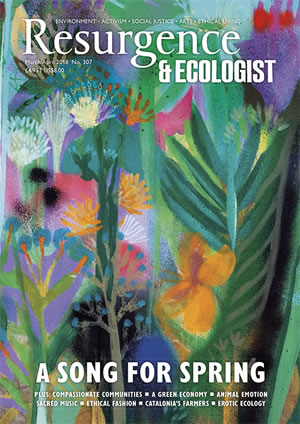After his collection of gloomy Guardian columns published under the title How Did We Get Into This Mess? it’s nice to have George Monbiot back with a hopeful response to his own question. In Out of the Wreckage, he reaches across traditional political divides to call for what he terms “the politics of belonging”: civic and political life based on collaboration and community rather than competition and alienation.
How do we get there? Monbiot’s central claim is that we need new stories. We’ve been suckered into a false view of ourselves, he says, and this lies at the heart of our coinciding crises. Neoliberal forces have shaped the world around us to such an extent that we have accepted the competition and marketisation of society as being reflective of human nature. But nothing could be further from the truth, argues Monbiot. We are in fact supreme cooperators and uniquely social beings. Recognising this fact, he says, is the first step towards climbing from the wreckage of our own making.
Above all, Out of the Wreckage stresses the importance of narrative fidelity in political stories. Good policies alone are not enough. Citing works such as George Marshall’s Don’t Even Think About It: Why Our Brains Are Wired to Ignore Climate Change, and Christopher H. Achen and Larry M. Bartels’ Democracy for Realists, Monbiot demonstrates how infrequently facts change our minds about issues, and how the idea of the rational, informed voter is little more than a myth. In almost all cases, from voting in elections to our reactions to the headlines, we simply side with our conception of the good guys, based on the worldview we happen to hold. “Facts, evidence, values, beliefs: stories conquer all,” he argues.
Recent events have borne out some of these ideas. Look at the then Labour Party leader Ed Miliband’s 2015 general election campaign in Britain. Taken individually, most of his policies appealed to a broad coalition of progressives. But taken together, they somehow managed to add up to less than the sum of their parts. There wasn’t a narrative coherence to hold them together. By contrast, a wholesale break with the neoliberal narrative helped his successor Jeremy Corbyn connect with millions of people in the 2017 election. Not that Corbyn gets Monbiot’s unqualified support: sadly, Monbiot maintains, a return to Keynesian solutions is no basis from which to govern in the face of monumental ecological collapse.
Instead, he calls for a brand new narrative that equips us to meet the challenges of the 21st century, rather than rerunning the mistakes of the 20th. In doing so, he proposes something that reaches across the political divides of left and right, and creates a new common sense that all parties and politicians adopt as their default position. We have seen this happen at least twice over the last century. In the United States, after the second world war, Republicans were as taken by the redistributive efforts of Keynesianism as were the Democrats. Then, just a few decades later, the Democrats were as happy as the Republicans to sign up to the privatisation and marketisation of neoliberalism. It’s this sort of seemingly unchallengeable consensus that Monbiot seeks to invent anew.
It’s a tall order, and while Monbiot makes a good fist of it, he (almost inevitably) comes up slightly short against the central conceptual challenge he has set himself. This is not a fully formed communications strategy for insurgent political movements. Indeed, as the book progresses, Monbiot deviates from his attempt to construct a narrative of everything, and instead ticks his way through a delicious wish list of bold political ideas, from universal basic income to sortition, to big organising techniques.
Despite being a slim punch of plain language, this is perhaps one of Monbiot’s less focused books, wandering from his attempt to create a grand narrative of the human condition to barbed asides about the pointlessness of political demonstrations. But it is hard to complain. Above all, it’s wonderful to hear Monbiot at his strident and hopeful best, making radical ideas feel reasonable and practical, rather than remote and theoretical. Bringing together post-growth economics with a revival of community and civic life and new ideas for genuinely participatory democracy, Out of the Wreckage provides some of the soil from which a progressive 21st-century political movement can flourish.







